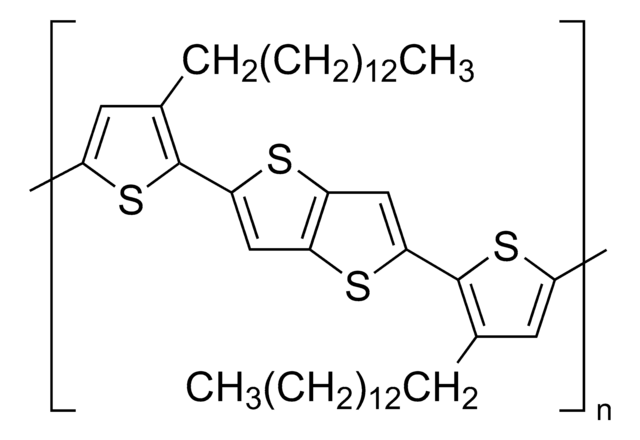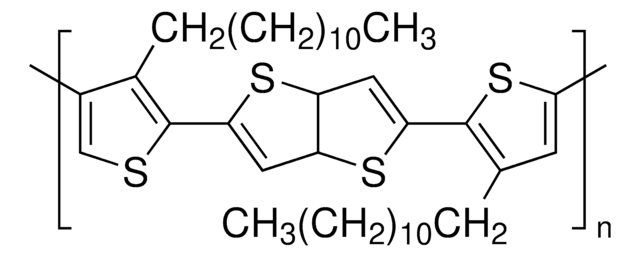754005
PCPDTBT
average Mw 7,000-20,000
Synonym(s):
Poly[2,6-(4,4-bis-(2-ethylhexyl)-4H-cyclopenta [2,1-b;3,4-b′]dithiophene)-alt-4,7(2,1,3-benzothiadiazole)]
About This Item
Recommended Products
description
Band gap: 1.75 eV
Quality Level
form
solid
mol wt
average Mw 7,000-20,000
loss
0.5 wt. % TGA, 350 °C
mp
>400 °C
λmax
700 nm
Orbital energy
HOMO -5.3 eV
LUMO -3.55 eV
OPV Device Performance
ITO/PEDOT:PSS/PCPDTBT:PC61BM/Al
semiconductor properties
P-type (mobility=2×10−2 cm2/V·s)
Looking for similar products? Visit Product Comparison Guide
Related Categories
General description
Application
Storage Class Code
11 - Combustible Solids
WGK
WGK 3
Flash Point(F)
Not applicable
Flash Point(C)
Not applicable
Choose from one of the most recent versions:
Already Own This Product?
Find documentation for the products that you have recently purchased in the Document Library.
Articles
The development of high-performance conjugated organic molecules and polymers has received widespread attention in industrial and academic research.
Organic materials in optoelectronic devices like LEDs and solar cells are of significant academic and commercial interest.
Organic photovoltaics (OPVs) represent a low-cost, lightweight, and scalable alternative to conventional solar cells. While significant progress has been made in the development of conventional bulk heterojunction cells, new approaches are required to achieve the performance and stability necessary to enable commercially successful OPVs.
Thin, lightweight, and flexible electronic devices meet widespread demand for scalable, portable, and robust technology.
Our team of scientists has experience in all areas of research including Life Science, Material Science, Chemical Synthesis, Chromatography, Analytical and many others.
Contact Technical Service






![Poly[2-methoxy-5-(2-ethylhexyloxy)-1,4-phenylenevinylene] average Mn 40,000-70,000](/deepweb/assets/sigmaaldrich/product/structures/344/488/b8f8179d-3970-4deb-a754-adda88cdb36f/640/b8f8179d-3970-4deb-a754-adda88cdb36f.png)
